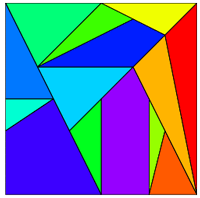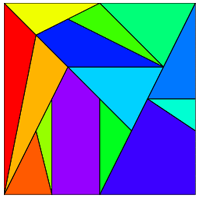-ics, -tics [-ac after i]
(Greek: a suffix that forms nouns and is usually used to form names of arts and sciences)
2. The physics of the relationship between color-carrying quarks, especially the nature of their strong interaction, which is characterized by the exchange of gluons.
Gluons are theoretical elementary particles without mass, thought to be involved in binding the subatomic particles of quarks together.
Chronokinetics may also include the manipulation of space as well in accordance with the time-space continuum, allowing teleportation.
The ability of chronokinesis is not likely to be the actual manipulation of time and space, but rather the chronokinetics manipulation of himself or herself in accordance with it.
This is derived from the fact that people with the power of chronokinetics are still held down by gravity when time is "frozen", are still able to breathe, the weight of other objects still apply, etc., all of which would be a focal point of why people believe in chronokinetics develop health concerns, which also supports the theory about the teleportation aspects of this ability.
"Teleportation" is a hypothetical method (in science fiction) of transportation in which matter or information is dematerialized, usually instantaneously at one point and recreated at another point with psychokinesis which is the supposed ability to use mental powers to make objects move or to otherwise affect them.
2. The coordination of biological rhythms (chronobiology) with medical treatment: Chronotherapy includes a person's biological rhythms in determining the timing and sometimes the amount of medication in order to optimize a drug's desired effects and to minimize the undesired ones.
2. The comparison and relation of motions or movements.
3. The branch of mechanics that studies the motion of a body, or a system of bodies, without consideration given to its mass or the forces acting on it.
4. The art of making motion pictures.
2. The study of the way in which governments work; and of the rights, the privileges, and the obligations of those who live in a municipality: When the mayor spoke to local groups, he tried to point out that civics was more than an educational study, but that all of them are responsible for doing what they can do to make life better, not only for themselves, but for everyone in the district.
2. A method of classification in which phylogenetic (evolutionary development or history) hypotheses (theories) are the basis for classification and the recency of common ancestry is the sole criterion for grouping taxa.
2. The branch of the humanities which includes the languages, literature, philosophy, history, art, archaeology, and other culture of the ancient Mediterranean World; especially, of Ancient Greece and Ancient Rome during the classical era.
2. The branch of discrete mathematics that deals with the study of arrangement of objects into sets, and in particular with two general types of problems: enumeration and existence.
3. The study of the number of ways in which a given problem can be solved.
An example of a very early study of combinatorics is the Stomachion
Stomachion is the name given to an ancient puzzle, or tangram, in one of Archimedes' treatises.
A tangram is a puzzle in which a square is divided into different geometric shapes and, like a jigsaw, must be put back together. In the treatise the square is divided into 11 triangles, two quadrilaterals, and a pentagon. Many assumed that Archimedes simply included it as a challenging game.
On the other hand, there are those who believe that Archimedes might have included the Stomachion to demonstrate multiple solutions to a problem. This suggests that the question Archimedes was tackling was: how many ways are there to complete a square, given the 14 pieces of the puzzle?
The Stomachion is described in fragmentary manuscripts attributed to Archimedes as noted by Magnus Ausonius (310-395 A.D.).
The puzzle is also referred to as the "loculus of Archimedes" (Archimedes' box) or "syntemachion" in Latin texts. The word Stomachion has as its root the Greek word meaning, "stomach."
It should be noted that Ausonius was referring to the figure as the ostomachion, an apparent corruption of the original Greek.


Examples of Stomachion puzzles.
The principal focus of such a procedure is the brain.
Preparations of cosmetics are therefore intended to promote the health and beauty of the complexion, hair, hands, and nails of the hands and even of the feet.
2. Something superficial that is used to cover a physical deficiency or defect: Even men utilize cosmetics to enhance their physical appearances.3. An item that is decorative rather than functional: As a hobby, Henry likes to put special fenders on cars that are cosmetic.
2. The physics of the interactions of moving, charged particles and magnetic fields in planetary atmospheres, stars, and interstellar and intergalactic space.
Cosmical physics includes geomagnetism, seismology, the tides, meteorology as related to cosmical causes, the aurora, meteoric phenomena, and the physical constitution of the heavenly bodies generally.


